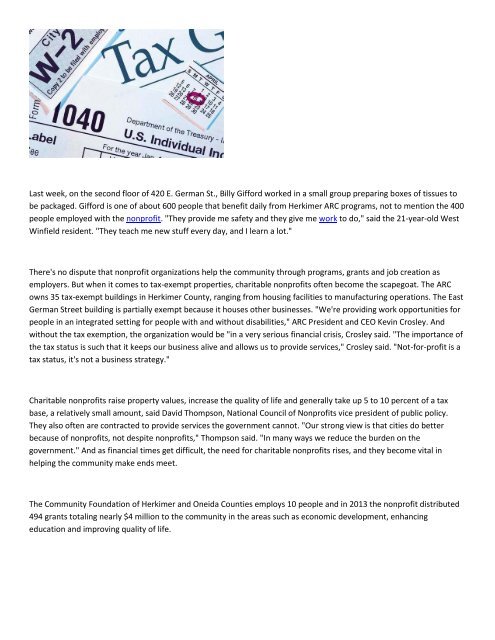The Corliss Institute - Charitable nonprofits: A little take, a lot of give
There's no dispute that nonprofit organizations help the community through programs, grants and job creation as employers. But when it comes to tax-exempt properties, charitable nonprofits often become the scapegoat.
There's no dispute that nonprofit organizations help the community through programs, grants and job creation as employers. But when it comes to tax-exempt properties, charitable nonprofits often become the scapegoat.
Create successful ePaper yourself
Turn your PDF publications into a flip-book with our unique Google optimized e-Paper software.
Last week, on the second floor <strong>of</strong> 420 E. German St., Billy Gifford worked in a small group preparing boxes <strong>of</strong> tissues to<br />
be packaged. Gifford is one <strong>of</strong> about 600 people that benefit daily from Herkimer ARC programs, not to mention the 400<br />
people employed with the nonpr<strong>of</strong>it. "<strong>The</strong>y provide me safety and they <strong>give</strong> me work to do," said the 21-year-old West<br />
Winfield resident. "<strong>The</strong>y teach me new stuff every day, and I learn a <strong>lot</strong>."<br />
<strong>The</strong>re's no dispute that nonpr<strong>of</strong>it organizations help the community through programs, grants and job creation as<br />
employers. But when it comes to tax-exempt properties, charitable <strong>nonpr<strong>of</strong>its</strong> <strong>of</strong>ten become the scapegoat. <strong>The</strong> ARC<br />
owns 35 tax-exempt buildings in Herkimer County, ranging from housing facilities to manufacturing operations. <strong>The</strong> East<br />
German Street building is partially exempt because it houses other businesses. "We're providing work opportunities for<br />
people in an integrated setting for people with and without disabilities," ARC President and CEO Kevin Crosley. And<br />
without the tax exemption, the organization would be "in a very serious financial crisis, Crosley said. "<strong>The</strong> importance <strong>of</strong><br />
the tax status is such that it keeps our business alive and allows us to provide services," Crosley said. "Not-for-pr<strong>of</strong>it is a<br />
tax status, it's not a business strategy."<br />
<strong>Charitable</strong> <strong>nonpr<strong>of</strong>its</strong> raise property values, increase the quality <strong>of</strong> life and generally <strong>take</strong> up 5 to 10 percent <strong>of</strong> a tax<br />
base, a relatively small amount, said David Thompson, National Council <strong>of</strong> Nonpr<strong>of</strong>its vice president <strong>of</strong> public policy.<br />
<strong>The</strong>y also <strong>of</strong>ten are contracted to provide services the government cannot. "Our strong view is that cities do better<br />
because <strong>of</strong> <strong>nonpr<strong>of</strong>its</strong>, not despite <strong>nonpr<strong>of</strong>its</strong>," Thompson said. "In many ways we reduce the burden on the<br />
government." And as financial times get difficult, the need for charitable <strong>nonpr<strong>of</strong>its</strong> rises, and they become vital in<br />
helping the community make ends meet.<br />
<strong>The</strong> Community Foundation <strong>of</strong> Herkimer and Oneida Counties employs 10 people and in 2013 the nonpr<strong>of</strong>it distributed<br />
494 grants totaling nearly $4 million to the community in the areas such as economic development, enhancing<br />
education and improving quality <strong>of</strong> life.







